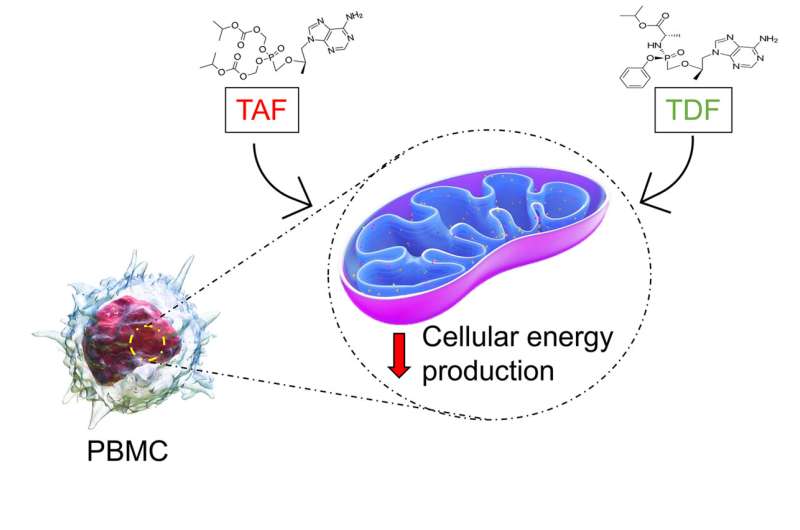This article has been reviewed according to Science X's editorial process and policies. Editors have highlighted the following attributes while ensuring the content's credibility:
fact-checked
peer-reviewed publication
trusted source
proofread
Commonly used antiretroviral drugs used to treat HIV and hepatitis B reduce immune cells' energy production

New UCLA-led research suggests that antiretroviral drugs called TAF and TDF directly reduce energy production by mitochondria, structures inside cells that generate the power that cells use to function. Both drugs led to reduced cellular oxygen consumption rates, a measure of the ability of the mitochondria to produce energy, compared with controls. But in combination with other antiretrovirals, TAF appeared to result in a larger energy reduction than TDF did. Whether this is a cause for concern is not known at this point.
The antiretroviral drugs tenofovir alafenamide (TAF) and tenofovir disoproxil fumarate (TDF) are used to treat HIV and hepatitis B infection in millions of people around the world. These drugs are also used as pre-exposure prophylaxis (PrEP) against HIV in uninfected people.
Using both a human clinical trial and experimental lab studies, the researchers assessed the impact of TAF and TDF in combination with other antiretrovirals on the ability of blood immune cells to make energy. In the clinical trial, 26 people with HIV switched antiretrovirals over nine months and the researchers assessed how the drugs affected their cells' energy production. The investigators confirmed these findings experimentally in the lab by directly adding the drugs to healthy immune cells and analyzing their impact on the cells' metabolism.
The clinical implications of the findings are unclear at this point, a question that requires more research. These drugs are well tolerated by millions of people worldwide, but the long-term clinical implications of these drugs on the ability of human cells to make energy is unclear.
"Mitochondria are key structures inside the cells. This is the among the first demonstrations that antiretrovirals used in humans in HIV and hepatitis B directly change the function of mitochondria to make energy," said senior author Dr. Theodoros Kelesidis, associate professor-in-residence of medicine in the division of infectious diseases at the David Geffen School of Medicine at UCLA. "We utilized independent research methods to confirm our findings. This is an important message, given that millions of people are on these antiretrovirals. It remains to be shown whether the effects of these antiretrovirals on mitochondria are mechanistically linked to certain metabolic changes that may be seen with the use of these antiretrovirals such as weight gain."
Study co-authors are Eleni Ritou, Sandro Satta, Anton Petcherski, Maria Daskou, Madhav Sharma, Hariclea Vasilopoulos, and Dr. Orian Shirihai of UCLA, and Eisuke Murakami of Gilead Sciences.
The study is published in the peer-reviewed journal Metabolism.
More information: Eleni Ritou et al, Blood immune cells from people with HIV on antiviral regimens that contain tenofovir alafenamide (TAF) and tenofovir disoproxil fumarate (TDF) have differential metabolic signatures, Metabolism (2023). DOI: 10.1016/j.metabol.2022.155395



















